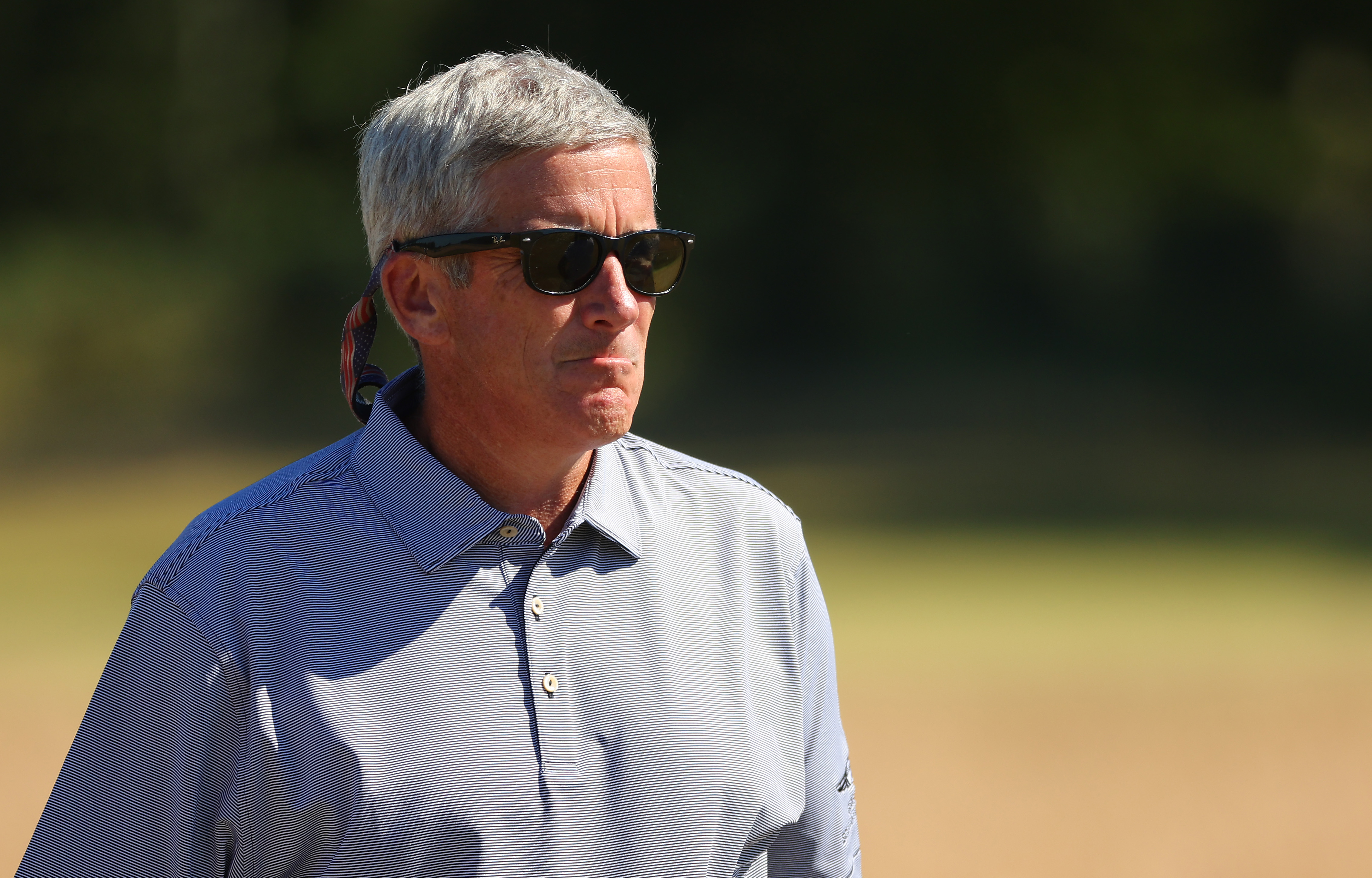ATLANTA — ”I was in the Virgin Islands once. I met a girl. We ate lobster, drank piña coladas. At sunset we made love like sea otters,” Bill Murray rants about the repetitiveness of his existence in the movie “Groundhog Day.” “That was a pretty good day. Why couldn’t I get that day over and over and over?”
Jay Monahan’s groundhog days also lack lobster, piña coladas and escapades worthy of frisky marine mammals. Instead, his involve press conferences in which he repeatedly declines to answer questions about the one subject folks wish to hear from him on: the state of negotiations with the Saudi Arabian Public Investment Fund. Wednesday brought another of those at East Lake Golf Club during the commissioner’s press briefing at the Tour Championship, the transcript of which will show considerable overlap with his last one, at the Players Championship in March, and with his appearance here last year. That Monahan has actually offered more detail on the talks than his PIF counterpart, Yasir Al-Rumayyan, counts for naught since MBS’s bag man doesn’t make himself available for questions and is held to different standards in many matters, not least transparency and accountability.
There were several topics Monahan was eager to discuss — his themes were “engagement, momentum and innovation” — but the focus was, predictably, on what he didn’t say. Or more accurately, what he wouldn’t say.
“As it relates to any details of the conversations that we’re having with the Public Investment Fund, I’m not going to disclose details. I’m not going to get into specifics.”
“I’m not going to negotiate details in public or disclose details or specifics. All I can say is that conversations continue, and they’re productive.”
“When you get into productive conversations, that enhances the likelihood of positive outcomes, and that enhances the spirit of those very conversations. I think that’s where things stand.”
The fact that Monahan won’t talk doesn’t mean there isn’t something to talk about. There’s a difference between being evasive and simply not being expansive. Sources familiar with the current state of the PIF discussions suggest there’s occasional activity but that any particulars are being laboriously lawyered. It’s also apparent that Monahan concerns himself with just one constituency: the Tour’s Policy Board, or more specifically, the player-directors on that body. He knows that unilateral decisions are beyond his remit as commissioner thanks to the trilateral commission that created the controversial Framework Agreement. He’s clearly uninterested in the two precincts most vocal about wanting to see action on a deal: golf media (thirsty for new material), and LIV players (desperate to be insulated from the consequences of their decisions).
That Monahan isn’t hearing a clamor for progress from his own members indicates how the balance of power has subtly shifted in the Tour’s favor.
Conventional wisdom has long held that a delay in reaching a deal is disadvantageous to the Tour, that time allows LIV more opportunity to poach players, that time bleeds out the Tour’s product, that time amplifies discontent among fans, sponsors and partners.
But one comment that passed largely unnoticed in Monahan’s prepared remarks hinted at a shifting reality. “We now have the structure and the resources we need to define the future of professional golf on our terms and the significant support of a world-class group of investors,” he said, referring to Strategic Sports Group, which injected $1.5 billion into the Tour in January.
Humorist Will Rogers once described diplomacy as the art of saying “nice doggie” until you find a rock. In SSG, Monahan found his rock. It provided him something the Tour didn’t have a year ago: $1.5 billion worth of options.
To be sure, there are weeks when the PGA Tour’s product struggles to breathe, but by comparison, LIV’s is in hospice care. It has an audience that could be comfortably accommodated in one of East Lake’s hospitality suites (as long as there’s wifi for online trolling), zero market traction, expensive contract renewals looming, all while being hostage to capricious internal politics in Riyadh. Monahan can be forgiven for thinking his hand is strengthened as time passes.
Only when a PIF deal is announced does the clock start ticking on the inevitable and time-consuming Department of Justice review as to whether it’s anti-competitive. Monahan must know that the DOJ will almost certainly demand PIF turn over the same discovery materials it refused to submit during the original antitrust litigation against the PGA Tour, and which it won’t give to a U.S. Senate subcommittee. Why would the Tour break into a sprint when running a marathon in which its only competitor has more hurdles and potholes to navigate?
For all the times he chose to remain circumspect today on the prospects of a deal, Monahan gamely tried to lay out a vision for the Tour’s future. There’s a plan to address fan frustrations (though it’s not readily apparent how can or will ameliorate broadcaster angst over ratings slumps). It remains to be seen what improvements or innovations his “Fan Forward” strategy will actually deliver, but its existence at least signals awareness that the Tour’s most pissed-off constituency is being heard, something Monahan promised to address back in March.
“We’re moving forward at speed and focused on what we can control, because that’s what we owe to our fans,” the commish said.
He didn’t announce $1.5 billion worth of innovation though, which raises intriguing questions about the Tour’s future ambitions or acquisitions with its nest egg. That too would be a sensitive subject, and questions he probably plans to leave unanswered at his next “State of the Tour” press conference, seven months from now.

